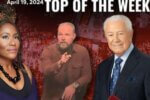In the name of pursuing the Holy Spirit, some charismatic believers have hurt each other and the church, Banning Liebscher said in a recent interview. The hurt is often the result of enthusiastic believers who relay messages without preaching or teaching it in the necessary context. Liebscher says he empathizes with those hurt by such behavior. His comments about excess and abuse in both charismatic and non-charismatic circles were part of a larger conversation between Liebscher and Preston Sprinkle, starting around 32 minutes in.
“It grieves my heart,” says Liebscher, the founder and director of Jesus Culture.
Liebscher says he’s seen many people leave Bethel and misrepresent or change its message by presenting it without proper context—and that can cause rifts in the body of Christ.
“They’d go back to their church, and they’d go back arrogant,” Liebscher says. “They’d go back to their church with this thing like, ‘Bethel’s got a corner on the Holy Spirit, our church isn’t hungry for the Holy Spirit, our church isn’t going after God,’ and all of a sudden these pastors—people are coming to our church and coming back, and what they’re experiencing is people who think their church is dead and is not hungry.”
Liebscher says he responded by emailing pastors, saying that if any had questions about things they were hearing about Bethel, the pastor should contact the ministry and they could meet to discuss it. One pastor took Liebscher up on the offer.
“I don’t want to name names, but he was second in charge of a movement,” Liebscher says. “He said, ‘I’d love to meet.’ So he came down, and we met. And that was one of the things he brought up. He said, Listen, ‘It’s just hard. Our people come back and they’re all thinking like we’re not hungry for the Holy Spirit.’ And just to be able to sit there and go, ‘Oh gosh, that’s so not our heart, we’re so sorry to hear that.'”
The problem may not be leaders, he says; it’s their followers and how they interpret the message. Often, the abusive person isn’t the top dog in an organization. Rather, the person is three, four, or even five layers down and chooses to cherry-pick certain teachings to fit their agenda.
“It’s the same with our movement. We have a grace message, but I’m listening to some people that might come out—the younger guys that are layers down—and I’m like where are you getting what you’re preaching? You can’t just come and take that one thing and not have the context around it,” Liebscher says.
Later in the interview, he adds, “I don’t know what to do about it at some level. I don’t know who these people are that are doing it. … It’s a tough one to navigate. Like all of a sudden now we [would just be] a people that are trying to manage all of the people that—we don’t even know they’re doing it. [We] had no idea they were going back to churches and acting like their church isn’t hungry anymore. That’s not our heart.”







Leave a Comment
You must be logged in to post a comment.